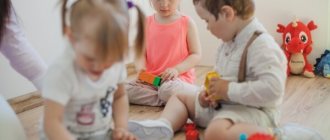The topic of a child’s adaptation to kindergarten does not lose its relevance. Many parents are faced with difficulties in getting their son or daughter accustomed to new conditions and do not know how to properly resolve them.
In this article, we will tell moms and dads what a child’s adaptation to a preschool institution involves, what degrees and stages of adaptation exist, and how to help the child adapt to the children’s group as quickly as possible.
Make sure that your child's adaptation is going smoothly or check if he has any problems so that you can help in time. Use the “Where are my children” application in combination with a children's smart watch - instantly contact your child, listen to the sound around you and always know where he is.
What is adaptation?
Imagine the world of a small child. Beloved mom and dad, familiar toys, a warm bed, familiar surroundings and daily routine.
And suddenly one day everything changes. His mother takes him to an unfamiliar place and leaves him with a strange aunt. Everything in this place is foreign - the toys, the crib, and the food are not the same as at home. And most importantly, there are a lot of unfamiliar children there, who often cry, and some may even offend. At this point you need to listen to the teacher and do everything she says. This place is called kindergarten...
⠀
Finding himself in an unfamiliar environment, the child is in a state of extreme stress. In order for him to get used to it, he must go through a period of adaptation. This term means the ability to adapt to environmental conditions, to adapt to them.
During adaptation, the activity of almost all systems of the child’s body undergoes a restructuring.
Adaptation of a child to the conditions of a kindergarten is usually accompanied by the following phenomena:
- regression of skills occurs (the child temporarily “forgets” how to go to the potty, hold a spoon, etc.);
- sleep and appetite worsen;
- the child looks depressed, lethargic, lethargic;
- frequent whims, hysterics for any reason.
There are 3 categories of children. For some, adaptation problems begin immediately, for others - after 2-3 weeks, for others there are no visible changes. This is due to many factors and depends on the adaptive capabilities of the child’s body.
You should not be afraid of changes in the behavior of your son or daughter. In this way, the child’s body copes with the stress and adapts to new conditions.
Degrees of adaptation
Designed by Freepik
There are mild, moderate and severe degrees of adaptation of a child to kindergarten.
Easy degree
A child with a mild degree adapts on average in 2-4 weeks. An easy degree of adaptation will be characterized by the following indicators:
- Sleep : the child sleeps peacefully during daytime and nighttime sleep, may sometimes wake up, but easily falls asleep again.
- Appetite : good, may be selective in dishes.
- Emotional state : even, calm.
- Behavior : without tears or hysterics, he lets go of his mother and remains in the group. Can keep himself busy playing.
- Communication with adults and peers: makes contact with teachers and children, can ask the teacher for help, gets involved in games with peers.
Even with a mild degree of adaptation, the child may initially experience sleep and appetite disturbances.
Average degree
The average degree of adaptation lasts more than a month. The child is often sick, and getting used to kindergarten is difficult due to long breaks.
Adaptation of moderate severity can be judged by the following criteria:
- Sleep: the child sometimes does not sleep during quiet hours; if he falls asleep, his sleep is restless and intermittent.
- Appetite: may refuse some dishes, eats little.
- Emotional state: often cries, is sad, mood changes for minor reasons. Can keep himself busy with the game, but for a short time.
- Behavior: has difficulty parting with his mother, and after she leaves he stands alone at the window for a long time.
- Communication with adults and peers: shows no interest in communication, constantly asks the teacher if mom will come soon.
A child with a severe degree of adaptation may take more than 2 months to get used to kindergarten, or may not get used to it at all. Then doctors recommend refusing to attend preschool.
Severe degree
Severe addiction is typical for children with disabilities.
The fact that it is not easy for a child to adapt to kindergarten can be judged by the following indicators:
- Sleep : the child does not sleep during quiet hours. At night, sleep is restless, intermittent, and there are night terrors.
- Appetite : decreased, may refuse to eat.
- Emotional state: depressed, the child seems to withdraw into himself or, on the contrary, is aggressive.
- Behavior: after mom leaves, she cries, screams, does not want to go into the group, and can sit in the locker room for a long time.
- Communication with adults and peers: does not make contact or shows aggression towards children and adults.
The completion of a child’s adaptation period can be judged by the stabilization of all indicators.
Make sure that your child's adaptation is going smoothly or check if he has any problems so that you can help in time. Use the “Where are my children” application in combination with a children's smart watch - instantly contact your child, listen to the sound around you and always know where he is.
Stages of addiction
The process of a child getting used to kindergarten takes place in several stages.
Stage 1 – period of maladjustment. No matter how the parents prepare the child for the nursery, at first he will still be in a state of stress and constant tension. It is difficult for a child to part with his parents; he often cries and is capricious. Colds may begin.
Stage 2 – adaptation period. The protective mechanisms of the psyche are triggered, the child begins to communicate with the teacher and other children, participates in games, but still misses his parents and often asks about them. At this stage, the baby is just beginning to get used to the new rules, so he may violate discipline and refuse to comply with the teacher’s demands.
Stage 3 – compensation period. The adaptation process is completed, the child gets used to the children's team, teachers and the new daily routine, and calmly lets his parents go for the whole day. The emotional background stabilizes, physiological indicators return to normal.
How long each stage will last depends on the individual characteristics of the baby.
The emotional state of the child during the period of adaptation
In order not to be angry with the child for bad behavior and whims during the child’s adaptation to kindergarten, parents need to try to understand his emotions. For a baby who has previously been constantly with his mother, starting to visit the kindergarten is a serious stress.
The peculiarities of children's adaptation in kindergarten are such that in the first stages negative emotions predominate - fear and anger. The baby does not want to enter the group, clings to his parents, and begins to whine. He is afraid that they will forget about him and will not take him away, he is afraid to stay with new people in an unfamiliar environment.
Sudden outbursts of aggression are possible - the child breaks out without allowing himself to be changed, or even tries to hit an adult. This is an expression of protest against separation from parents, which should smooth out as one gets used to the conditions of the kindergarten.
If a few minutes after the mother leaves the child calms down, adaptation proceeds normally. In the future, the baby may still periodically whine when parting and in company with other children, but gradually the negative will be replaced by positive emotions from new impressions, games, and communication. The end of a child’s adaptation to the conditions of kindergarten can be recognized by the child’s good mood in the evening and easy farewell to parents in the morning.
The influence of various factors on adaptation
How long it will take a child to get used to a child care facility is influenced by many factors. Let's look at the main ones.
Child's age
The situation is such that many mothers strive to send their children to kindergarten as soon as possible and go back to work after maternity leave. Therefore, recently the need for nurseries has increased, starting to accept children from one and a half years old, which not every preschool institution has.
Most experts believe that the younger the child, the more difficult his adaptation period is, since the immune system has not yet strengthened and the need for parental care and attention has increased.
Therefore, the optimal age for starting kindergarten life is considered to be 2.5 - 3 years. And pediatricians insist that parents send their children to kindergarten no earlier than three years of age.
Read detailed material with expert opinions on this topic – Is it time to go to kindergarten? When is the best time to give up a child and what does a parent need to know?
Health status
As we have already said, children with limited health capabilities or private colds and chronic diseases have a hard time getting used to kindergarten.
Therefore, parents should postpone kindergarten and wait until the child’s body can adapt to preschool without serious consequences.
Level of development of skills and abilities
By the beginning of kindergarten life, children should have all the necessary skills and abilities: go to the potty, hold a spoon, drink from a cup, partially dress and undress themselves, and also be able to ask an adult for help.
If parents are used to doing everything for the child, it will be difficult for him to get used to independence. Accordingly, his adaptation period may be prolonged.
Level of socialization
In kindergarten, the child will have contact with a large number of children and adults. It’s good if he already has such communication experience. Otherwise, it will be very difficult for a child who is accustomed to seeing only his mother and father next to him to get used to the children's team and teachers.
How to get your child to talk if you suspect that he is being bullied or beaten in kindergarten?
Also, the duration of adaptation depends on the personality of the teacher to whom the child is assigned, the number of children in the group, the characteristics of the child’s nervous system and the atmosphere in the family.
The harm and benefits of nurseries
Theoretically, you can send your baby to a nursery as early as 9 months, but in practice few people decide to do this. Such an early age usually does not allow the baby to serve himself, because in order to go to kindergarten, you need to be able to eat and ask to go to the potty. Read more about how to potty train your child →
Even if the family has a difficult financial situation and the mother needs to go to work, psychologists recommend thinking about keeping the child in a nursery group no earlier than he turns 1 year and 6 months. Otherwise, deep stress is guaranteed for both the baby and the parents.
Of course, starting early in kindergarten has its advantages:
- Mom will be able to go to work and the family’s financial situation will improve.
- The child will follow a daily routine in the nursery that is optimal for his age, receive a balanced diet, regular walks, and acquire his first physical education skills.
- Communication with other children helps the child develop new skills.
But there are also significant disadvantages:
- The child will get sick more often, since infections spread very quickly in children's groups.
- There is a greater chance that the adaptation of children in the junior nursery group of a kindergarten will be difficult, since at 1.5-2 years they are not yet ready to be separated from their mother.
- Even the best teacher is physically unable to give each child in the group the amount of attention required at this age.
- If the baby still speaks poorly, he will not be able to tell you that someone is offending him in the garden.
- Many important moments of a child's growing up may pass you by. In addition, there is a high probability that he will adopt the habits and behavior of his teachers, and not his parents.
From the point of view of medicine and psychology, the process of children’s adaptation to kindergarten conditions is easier if they have already reached 2.5-3 years of age. Until this moment, it is not advisable to send the baby to a nursery.
How to help a child adapt?
Rules for successful adaptation
- Rule 1. Get to know the kindergarten staff, daily routine and living conditions in advance.
- Rule 2. The child’s adaptation to kindergarten should occur either in the summer or in the winter to reduce the risk of infectious diseases.
- Rule 3. Vaccinations, medical examinations and other visits to doctors must be strictly before the child enters kindergarten.
- Rule 4. In the first days, the child must stay in kindergarten for 1-2 hours. It’s good if this time coincides with a morning walk.
- Rule 5. The child’s time in the group should be increased gradually, taking into account the teacher’s recommendations.
- Rule 6. If a child is sick, mom or dad needs to stay home with him.
- Rule 7. Parents must warn the teacher about all the peculiarities of the child’s behavior, his habits and inclinations.
- Rule 8. When taking your baby home, be sure to ask the teacher how the child behaved during the day.
By following all these rules, parents greatly facilitate the child’s adaptation period in kindergarten.
Psychologist's advice
- Your child needs to be prepared for kindergarten in advance.
Show your child the building, the windows of the group where he will be, and the area for walking. Meet the teachers. It’s not bad if the child learns their names before the first visit. Draw your son or daughter's attention to the fact that parents take all children home in the evening; no one stays overnight.
- The more a child knows about the rules of behavior in a child care facility, the easier the adaptation period will be for him.
The famous Moscow teacher Tatyana Vladimirovna Ostrovskaya invites parents to play a game with their children called “Kindergarten for Animals” before visiting kindergarten. You can use soft toys, dolls, construction sets. The child, together with mom and dad, creates various play situations: “Coming to kindergarten”, “Farewell to mom”, “Breakfast”, “Walk”, “Quiet hour” and others. Thus, the child gets acquainted with what awaits him in kindergarten in a homely atmosphere.
- A child’s ability to successfully adapt largely depends on the psychological attitude of the parents.
The calmer mom and dad are about their child’s visit to preschool, the more confident the child feels in an unfamiliar group.
- Don't forget to develop the necessary self-care skills. Try to give your baby more independence, even in things that he doesn’t yet know how to do.
- Pay attention to developing your child’s communication skills.
He must be able to communicate not only with children, but also with adults. Practice your communication skills when visiting, on the playground, or when visiting relatives.
- The home menu, as well as the regime, should be as close as possible to the garden. Even during weekends and holidays.
- Be friendly and polite to teachers. After all, these are the people to whom you trust the most valuable thing - your child. And not only you, but 20 other moms and dads like you.
- During the adaptation period, the child should not have any additional stress, such as moving, parental divorce, or the birth of a second child. Try to provide a calm family environment.
- Be calmer about illnesses after visiting kindergarten.
During the adaptation period, the child’s sensitivity to all environmental influences increases. Plus, the body cannot always cope with the mental load. “Going into illness” is a protective reaction of the body, both children and adults. The sick child remains in his home, familiar environment. This will continue until he feels safe and comfortable not only at home, but also in kindergarten.
- There are special therapeutic fairy tales that help the baby ease his adaptation to kindergarten. Read them at night and discuss them with your child. It will also be useful to watch cartoons, look at illustrations and photographs of mom and dad from kindergarten.
- Do not forget that after a long break (for example, due to illness), the child’s adaptation process begins anew. This means that problems such as painful separation from mom, tears, hysterics and reluctance to go to kindergarten return.
- Use modern technologies to calm your anxiety and find out how your child has settled into a new place, whether his peers are bullying him, and whether his teachers are behaving correctly. Buy a GPS watch for your child (they are available even for the youngest) and install the “Where are my children” application on your smartphone. With this kit, you can instantly contact your child and listen to what is happening around him in kindergarten while you are not around. When purchasing a children's smartwatch on the official website, the “Where are my children” license comes as a gift!
- If you are concerned about strong changes in your child’s behavior associated with the adaptation period, seek help from a psychologist.
What is not recommended to do during the adaptation period?
- Sit in the locker room while the child is in the group.
- Leaving secretly without saying goodbye to the child.
- Scold and punish for not wanting to stay in kindergarten.
- Leaving the child for the whole day after a long break.
- Speak negatively about teachers and preschool institutions.
- Deceive the child: say that you will pick him up soon if you yourself plan to leave your son or daughter until the evening.
- Bringing a sick child to kindergarten.
- “Bribe” the child with sweets and toys for his stay in the nursery.
Stages of adaptation
Experts identify several periods, summarizing them with pronounced negative reactions and unusual behavior. All children are unique and individual, so this division into stages is quite arbitrary; it helps to roughly delimit the periods and understand how easy and successful adaptation will be.
- The first stage is called acute, it is the most difficult, as a rule. The child is in a stressful state, the entire child’s body is in mobilization, the baby is tense and scared. Most often, tearfulness, hysteria, whims, and screams are noted. Physiology also changes. You can observe an increase in pressure, pulse, or, conversely, a decrease in heart rate. The child is more susceptible to all kinds of infectious diseases.
- The next stage is moderately spicy. The child’s negative reactions decrease, he begins to adapt to new circumstances, places and people, appetite and sleep return, and the psycho-emotional background improves. However, you should not hope that the situation has improved; it is too early to talk about complete adaptation, since everything can return to the first stage, along with hysterics, tears and a reluctance to let mom go in the morning.
- The final stage is compensatory. At this stage, the child’s emotional background stabilizes. There is a complete restoration of mental and physiological states. The baby begins to interact with peers, the teacher, and quite successfully integrates into the new “habitat”.
How to make it easier to separate from your child in kindergarten?
In order for your baby to learn how to painlessly let you go and go to the group, follow these simple recommendations:
- prepare your child in advance for the idea that he needs to go to kindergarten every day while mom and dad are at work;
- on the way, tell your child how good he will be there today, what interesting games he will play there, what delicious things the aunt-cooks will cook, etc.;
- come up with your own farewell ritual for your child. This could be a kiss on the cheek and the touching of palms or a short poem. The main thing is to always follow it when parting with your son or daughter, not only in kindergarten, but also at home;
- Allow your child to take his favorite toy with him. In the absence of his mother, he will be much calmer if there is something close and familiar;
- Monitor your own emotional state. All your anxieties and fears will certainly be passed on to your child;
- clearly inform your child about the time of your arrival: after lunch, after sleep, in the evening, so that he does not have vain expectations.
Remember, dear mothers and fathers: the key to a child’s successful adaptation to kindergarten is the correct preparation of the baby, the psychological literacy of the parents, as well as a family atmosphere of comfort and emotional well-being.
2
How do young children adapt to the conditions of a preschool educational institution?
During the period of getting used to kindergarten, children often demonstrate such unusual behavior that it frightens their parents. However, these features are typical for every new student and are caused by mental stress, which gradually disappears.
Features of children’s adaptation to preschool conditions include the following manifestations:
- Emotions. The baby clearly demonstrates that he does not like the new environment - he whines, often cries, often gets angry or becomes inhibited. These reactions are based on the fear of being left alone, the fear that his parents have abandoned him.
- Interaction with other children and teachers. Usually, in the first days of kindergarten, the child does not make contact well. This is largely due to the fact that children 2-3 years old do not yet know how to engage in joint games; Basically, they play next to each other, but each in their own game. Successful adaptation is evidenced by willing responses to the teacher’s requests and the desire to be close to peers.
- Changing skills. Adaptation of preschool children to preschool educational institutions often causes a “rollback” - the child temporarily forgets how to eat with a spoon, how to sit on the potty correctly, etc. Successful adaptation helps him quickly restore what he has forgotten.
- Changes in speech. During adaptation, some children stop using previously learned words and their vocabulary becomes scarcer. Its gradual recovery speaks in favor of normal adaptation to preschool education.
- Sleep, especially during the day, is perhaps the most striking manifestation of anxiety during adaptation. Children sleep poorly, often cry and jump up. During the day it becomes impossible to put them down; at night they are restless. Once adaptation is complete, sleep returns to normal.
- Appetite. A decrease in appetite is usually caused by unusual food that the baby is forced to eat in kindergarten. Restoration of appetite is a sign of a child’s addiction, even if at first he does not eat the entire portion.
Tips from Komarovsky for parents on how to adapt their child to kindergarten
A famous doctor also speaks about the adaptation of a young child in kindergarten. Evgeniy Olegovich believes that successful adaptation to a preschool educational institution is one of the conditions for the harmonious development of a child. He gives the following advice to parents regarding their child's adaptation to kindergarten:
- Do not go to work on the same day that your child goes to kindergarten for the first time. Komarovsky believes that adaptation in kindergarten will be better if the mother has a few weeks left to sit with the baby for a few days if he is unwell, without creating problems for himself at work.
- Getting used to kindergarten is better in winter and summer; during off-season periods there is a higher probability of going on sick leave, going to kindergarten for only a few days. In this case, after the illness, adaptation in kindergarten, according to Komarovsky, will begin anew.
- It is mandatory to prepare the immune system for encounters with new viruses and bacteria: harden yourself, eat fresh fruits and vegetables to fortify the body, walk more often and longer.
- According to Komarovsky’s advice, adaptation in kindergarten will be easier if at its initial stages you lower the level of demands on the baby: allow him a little more than usual, be more lenient towards his whims and requests.
Personal practice with children adapting to kindergarten
- Arseny came to kindergarten at the age of three and a half years. He was very attached to his mother, screamed loudly upon arrival at kindergarten, lay on the floor and refused to get up - this was the case from the first day. A few days after the first visit, my mother made the main mistake: she entered the group with him and began to play with him. When he was distracted, she quickly ran away from the kindergarten. Realizing that his mother was missing, Arseny began to become hysterical: the teachers could not calm him down, he threw toys at the children, at the teachers, screamed, and beat the floor with his hands and feet. The teachers had to turn to a full-time psychologist. Seeing a new person in the group, the kid froze. Taking advantage of the moment, we managed to get him to talk. He answered simple questions: what is his name, which of his toys does he like, what does he like to do. The boy was very tense physically and psychologically; it was clear that it was difficult for him to be in the group. Therefore, the psychologist took him to his office and tried to relieve emotional stress with the help of games in the sand, modeling and drawing. Additionally, consultations were held with teachers and the mother. The child attended classes for 3 months, during which the psychologist first relieved emotional stress and then gradually worked to adapt it to the group.
- There was a three-year-old girl, Katya, with a dysfunctional family situation: her mother gave birth to her at the age of 17, and after that, leaving the baby with her grandmother, she left for another city. Katya saw her no more than once every six months. In addition to Katya, the grandmother was in the care of the grandfather without both legs. The woman tried her best for her granddaughter. She treated her with love, but the girl apparently did not have enough attention. From the first day she went to kindergarten very calmly: she didn’t cry, she immediately ran to play with the kids and toys, and when her grandmother came for her 2 hours later, she didn’t want to leave. The next day, the baby voluntarily stayed for an afternoon nap. A couple of weeks later, for several days, she was cranky when she arrived at kindergarten, but quickly calmed down and, ultimately, adapted well.
Forms of adaptation to kindergarten depend on many factors: the condition and personal characteristics of the child, family situation, level of socialization and much more. Parents can help the baby by teaching him independence in advance and not rushing things in the process of getting used to it. If you listen to teachers and other preschool teachers, and also listen to your child, then his adaptation will be easy and without much stress.
What influences a child’s adaptation to kindergarten?
Factors that influence the process of a child’s adaptation to a preschool institution include:
- his age;
- general physical development and health status;
- presence or absence of basic self-care skills;
- correspondence between the home regime and the daily routine of the preschool institution;
- level of contact and sociability;
- development of gaming activities.
Children who are not used to:
- regime;
- performing basic hygiene procedures;
- independent play with toys;
- interaction with peers and unfamiliar people.
In addition, the baby may have peculiar habits that negatively affect his development. Adaptation is very difficult if the child is too attached to his mother.








